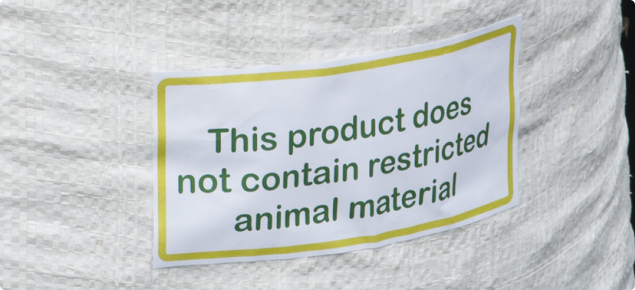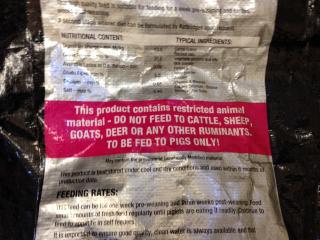Please note: This content may be out of date and is currently under review.
In Australia, it is illegal to feed restricted animal material (RAM) to ruminants (cattle, sheep, goats, deer, camels and alpacas). This is known as the 'ruminant feed ban'.
The Department of Primary Industries and Regional Development (DPIRD) is responsible for enforcing the ruminant feed ban in Western Australia.



Australia’s ruminant feed ban was introduced in 1996 to help keep Australia free of bovine spongiform encephalopathy (BSE, also known as ‘mad cow disease’).
BSE is a fatal brain disease that affects cattle. There is no treatment or vaccine for BSE. It is one of a group of diseases known as transmissible spongiform encephalopathies (TSEs), which includes scrapie in sheep and goats, and chronic wasting disease in deer. TSEs have never been reported in other livestock species such as pigs and poultry.
BSE is transmitted when cattle eat feed contaminated with the BSE protein.
The consumption of BSE-affected meat has also been linked to a human disease, variant Creutzfeldt-Jakob disease.
The BSE protein is resistant to commercial treatment procedures typically used to inactivate viruses, such as heat. Therefore, it may not be destroyed through the rendering processes.
Many countries will not import livestock and livestock products from countries where BSE is present. Australia is free of BSE and internationally recognised as having the lowest possible risk status for BSE. The ruminant feed ban has been a critical part of achieving this status. Additionally Australia’s strict biosecurity requirements include border screening, import controls, and surveillance and monitoring of sheep, goats and cattle for signs.
Maintaining Australia’s freedom from BSE is important for protecting the health of humans and animals, and for maintaining consumer confidence in our livestock industries.
The ruminant feed ban has requirements that must be met along the entire animal feed supply chain, including stockfeed manufacturers, feed retailers and stock producers. These requirements are summarised as:
RAM is any material that consists of, or contains, matter from an animal (including fish and birds). It does not include gelatine, milk or milk products.
Tallow and used cooking oil are not considered RAM if they have been processed to the specifications outlined in the Biosecurity and Agriculture Management (Agriculture Standards) Regulations 2013, and as detailed in the National Standard for Recycling of Used Cooking Fats and Oils Intended for Animal Feeds, published by the Australian Renderers Association.
Examples of RAM include:

Anyone who owns or takes care of ruminants must make sure they are not fed RAM. You can do this by following these steps:
Manufacturers and resellers of ruminant feed must make sure it is:
The requirements of the ruminant feed ban are contained in the Biosecurity and Agriculture Management (Agriculture Standards) Regulations 2013. For a full copy of the regulations, visit https://www.legislation.wa.gov.au.
DPIRD conducts regular inspections of all stockfeed manufacturers, and selects a certain number of retailers and livestock producers to inspect each year. These inspections (including number and frequency) are guided by the Australian Ruminant Feed Ban National Uniform Guidelines. All states and territories must report to Animal Health Australia on the outcomes of their inspections, which are collated and published annually on its website.
Failure to comply with ruminant feed ban regulations can result in $2000 fines for each offence.
If you have any questions about the ruminant feed ban and its requirements, contact DPIRD’s Livestock Biosecurity team by emailing livestockbiosecurity@dpird.wa.gov.au
A factsheet of this information can be downloaded from the documents section on the right hand side of this webpage.